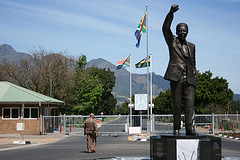Hello everyone!
Although Italy is a long way from South Africa, the death of Nelson Mandela has brought back memories of my birthplace and events which were a catalyst to my family’s emigration. Having read a number of articles over the last few hours, I decided to share a piece I wrote whilst at university. It is a moment in time — an experience — that is stamped indelibly in my memory. And yes, I was one of the disenfranchised.
In protest 
South Africa, 1976
It was the year when the illusion of passive acceptance and the thin veneer of apathy erupted. Latent frustration and anger over inequality and the loss of freedom simmered, gathered momentum, then boiled over in another generation of disenfranchised South Africans.
On a clear, sunny day in October 1976, we filed outside to form orderly rows in front of the school building. There was an unaccustomed silence, broken only by the swish of cars moving along the freeway, the city’s artery to the distant plains and currently the heart of dissent and rebellion in Cape Town.
At the forefront, two seniors stood holding a large banner with the words ‘freedom from oppression’ in large black lettering. To the side, a few teachers stood quietly with Mr Ritchie, our sometimes feared, but greatly respected principal, looking dignified and upright as usual. The other teachers – white South Africans – stayed upstairs, out of sight; this was not their fight.
We waited.
Freeway drivers tooted their horns in support, but no-one stopped. People did not want to get involved. They did not want to be around when the anti-riot squad turned up.
And they would. We were expecting them.
Our only uncertainty was what would happen when they turned up.
Suddenly, one, two, a dozen army jeeps came to a screeching halt and what seemed to us to be the entire South African army, came pouring out. In camouflage gear and replete with gas masks, canisters and truncheons and brandishing menacing looking guns they formed a semi-circle facing us.
They were prepared to quell any uprising.
They aimed their guns at us whilst the leader shouted in Afrikaans – one of the tools of oppression we were protesting. The books in that language had recently served as fuel for the fires of protest at other schools across the city.
We stood, uncertain.
But also defiant.
Mr Ritchie stepped forward. Instantly, a dozen guns were trained on him. The leader now had a focus for his vituperation. Ostensibly out of control, or maybe just drunk with power, he shouted abuse at this dignified man, who in turn, stayed quiet and steadfast. With no reaction from this quarter, the man gesticulated with his weapon, shouting that he wanted us to move inside.
At once, or else.
We had heard the stories and seen the destruction wreaked by these squads. To incite riots and then use tear gas and rubber bullets was a common theme. Students had been thrown from the second storey of a building and then tossed into the backs of trucks not a week before.
We knew that those tear gas canisters were real and that in an instant, our peaceful protest could deteriorate into a nightmare. Everything hinged on our reaction.
Mr Ritchie came toward us, his back to the guns, and in his usual quiet, measured tones said, ‘I want you to turn around and move back into the building in an orderly fashion’.
Nobody moved.
‘Now’, he said.
Guns may have been the language of the South African police but here, his word was law. We walked quietly back into the building. There would be no chaos here today, no tear gas or rubber bullets sprayed indiscriminately into an unruly crowd.
It had been a successful protest.
[divider][/divider]
Rest in peace Nelson Mandela
Alla prossima …Isabella

Leave a Reply